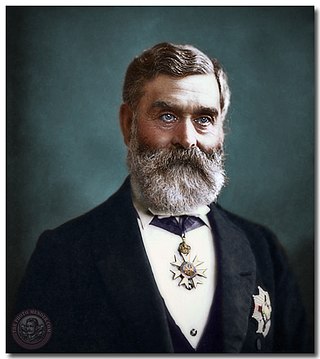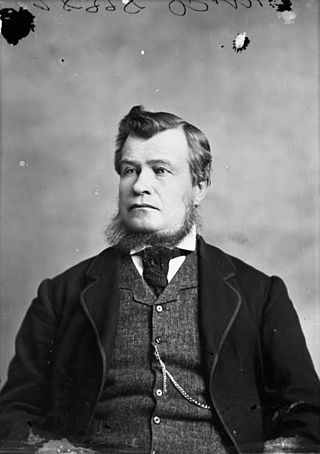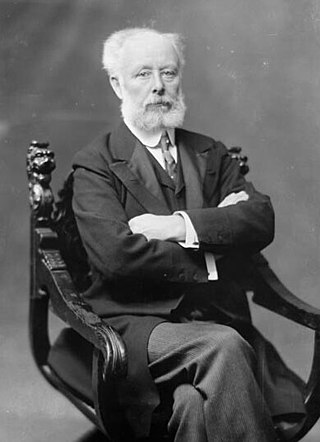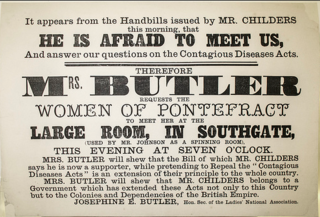Related Research Articles

The 1872 United States presidential election was the 22nd quadrennial presidential election, held on Tuesday, November 5, 1872. Despite a split in the Republican Party, incumbent President Ulysses S. Grant defeated Democratic-endorsed Liberal Republican nominee Horace Greeley.

Sir Adams George Archibald was a Canadian lawyer and politician, and a Father of Confederation. He was based in Nova Scotia for most of his career, though he also served as first Lieutenant Governor of Manitoba from 1870 to 1872.

John Kent arrived in Newfoundland in 1820 and started working for his uncle, Patrick Morris, a successful businessman and entrepreneur.

The 1872 Canadian federal election was held from July 20 to October 12, 1872, to elect members of the House of Commons of Canada of the 2nd Parliament of Canada. Prime Minister Sir John A. Macdonald's Conservative Party remained in power, defeating the Liberals. However, the Liberals increased their parliamentary representation considerably, while the Conservative seat count remained static, giving them only six more seats than the Liberals. The election produced the country's first minority government. The support of two independent Conservative MPs functionally gave Macdonald an extremely slim majority that allowed it to survive for two years, until it fell due to scandal.

Sir William Vallance Whiteway, was a politician and three time Premier of Newfoundland.

James Colledge Pope, was a land proprietor and politician on Prince Edward Island (PEI), Canada. He served as premier of the colony from 1865 to 1867, and from 1870 to 1873. He was premier of PEI in 1873 when the island joined Canadian confederation.

Sir Louis Henry Davies was a Canadian lawyer, businessman and politician, and judge from the province of Prince Edward Island. In a public career spanning six decades, he served as the third premier of Prince Edward Island, a federal Member of Parliament and Cabinet minister, and as both a Puisne Justice and the sixth Chief Justice of Canada.
Sir Henry Spencer Moreton Havelock-Allan, 2nd Baronet DL was a Liberal Party politician in the United Kingdom.

Sir Thomas Dyke Acland, 11th Baronet, FRS was a British educational reformer and a politician who sat in the House of Commons between 1837 and 1886 initially as a Tory and later, after an eighteen-year gap, as a Liberal.
Henry Francis Compton was a British Conservative politician. He was elected Member of Parliament (MP) for New Forest at a by-election in 1905, but only weeks later lost the seat to the Liberals at the 1906 general election.

The 1922 Bodmin by-election was a parliamentary by-election for the British House of Commons. The constituency of Bodmin in Cornwall polled on 23 February 1922. The by-election was notable for the opposition Liberal Party gaining a seat from the Coalition-supporting Conservative Party.
Independent progressive is a description in the United Kingdom and elsewhere, to denote a political progressive, who lacks a formal affiliation to a party.

The 1872 Pontefract by-election was fought on 15 August 1872. The ministerial by-election was fought due to the incumbent Liberal MP, Hugh Childers, becoming Chancellor of the Duchy of Lancaster and Paymaster General. It was retained by Childers.
The 1872 Aberdeen by-election was fought on 29 June 1872. The election occurred as a result of the death of the incumbent Liberal MP, William Henry Sykes. It was won by the "Moderate Liberal" candidate John Farley Leith against the official Liberal candidate James William Barclay, whose reputation as a Radical led to a split in the local party
The 1872 Flintshire by-election was fought on 2 March 1872. The by-election was fought due to the incumbent MP of the Liberal Party, Lord Richard Grosvenor, becoming Vice-Chamberlain of the Household. He was returned unopposed.
The 1872 Northern West Riding of Yorkshire by-election was fought on 3 February 1872. The byelection was fought due to the Death of the incumbent MP of the Liberal Party, Sir Francis Crossley. It was won by the Conservative candidate Francis Sharp Powell.
The 1870 Roxburghshire by-election was fought on 2 March 1870. The by-election was fought due to the resignation of the incumbent Liberal MP, Sir William Scott. It was won by the unopposed Liberal candidate Marquess of Bowmont.
The 1878 Londonderry County by-election was fought on 18 December 1878. The by-election was fought due to the death of the incumbent Liberal MP, Richard Smyth. It was won by the Liberal candidate Sir Thomas McClure.
The 1878 Reading by-election was fought on 17 May 1878. The by-election was fought due to the death of the incumbent Liberal MP, Sir Francis Goldsmid. It was won by the Liberal candidate George Palmer.
Sir John Davie Ferguson Davie, 2nd Baronet, known as John Ferguson until 1846, was a British Liberal politician, and British Army officer.
References
- ↑ Craig, F. W. S., ed. (1977). British Parliamentary Election Results 1832-1885 (hardcover) (1st ed.). London: Macmillan Press. p. 506. ISBN 978-1-349-02349-3.